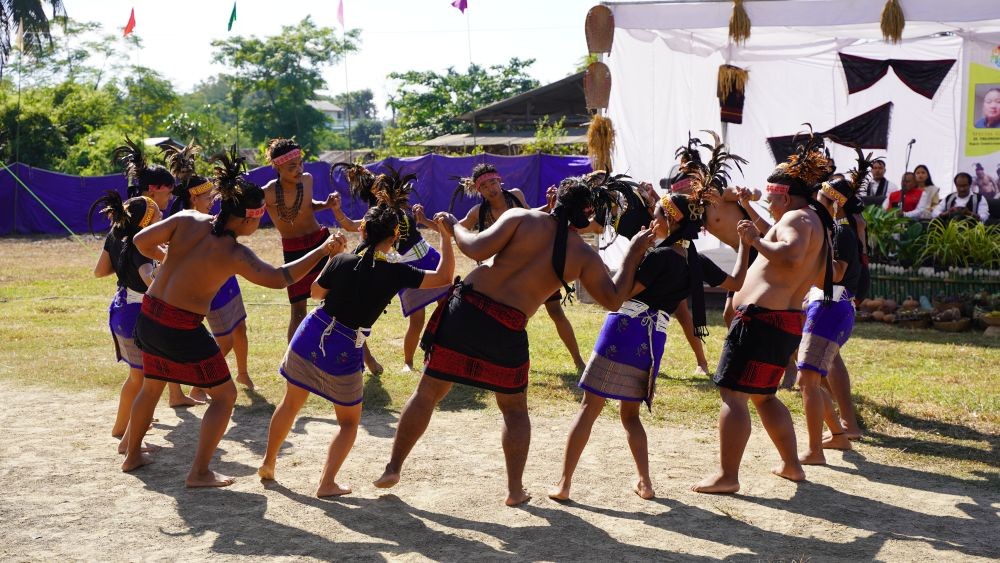Garo Students’ Union, Samaguri Unit performs the Cha’chatosa in Eralibill village, Dimapur on November 21.

Morung Express News
Dimapur I November 21
The Wangala Mini Hornbill Tribal Festival, organised by the Nagaland Garo Tribal Council (NGTC), commenced at Eralibill village in Dimapur on November 21.
The Wangala is a “thanksgiving” ceremony to Misi Sajlong for having blessed the human beings with rich harvest. It is the most significant post harvest festival of the Garos, generally held in the month of October to November.
Deputy Commissioner of Dimapur, Dr Tinojongshi Chang, in his address as the special guest, stressed the need for more cultural exchange programme stating that these events pave way for unity, understanding and the preservation of the rich cultural heritage.
Chang appreciated the government’s initiative of providing platform and funding to every tribe in Nagaland to celebrate a mini Hornbill festival.
Stating that Dimapur is a mini Nagaland where every tribes of Nagaland lives together in peace, fully understanding and sharing each other’s problem, he said it is both a privilege and a responsibility of the citizen of Dimapur to maintain unity and understanding.
Calling for the preservation of our cultural heritage and identity, Chang mentioned that many youngsters were shying away from speaking our own dialects and performing our own traditional dances.
He stressed upon the very fact that Nagas have many learnt educated people in different tribes, and called upon the learnt scholars to preserve and document it for the younger generation.
Acknowledging that everyone was giving the best for a greater Nagaland, he said ‘the government’s policy is not to discriminate’ but for the betterment of our future generation.
Regarding the exercise of RIIN in Nagaland, he said it was to identify the actual indigenous people, not only meant for the four communities but for every tribes of Nagaland. However, he said, the government has taken up phase wise where they first register the tribes with fewer population.
Furthermore, he encouraged the people to approach the administration for any problems or issues, stating “we are here to assist you.”
The president of Association of Indigenous Minority Tribes of Nagaland (AIMTN) S K Khemprai, in his address as the guest of honour, called on the people to carry on the traditions and cultures we have inherited, and further emphasised that “we should not give up our age old culture just because we don’t do agricultural farming anymore.”
Khemprai also appealed to the gathering, particularly the four tribes (Garo, Kuki, Kachari and Mikirs) to pray, that God may get us out through our crisis in good hand.
The president of NGTC Karampal G Momin, in his welcome address, said that the gathering was not merely for a celebration but to reaffirm our shared identity, cultural pride and tradition that have sustained the Garo community through generations, and added that this festival stand as a renewed purpose for unity and cultural heritage of the Garo people.
The programme was marked by performances of Cha’chatosa by the Garo Students’ Union (Samaguri Unit), Wangkimit by Garo Cultural Troupe Dimapur, Wangala Dance by Garo Cultural Troupe Eralibill and Samaguri village, cultural display by Cultural Troupe Dhansiri (Golaghat Assam) and Mech Kachari Cultural Troupe.






